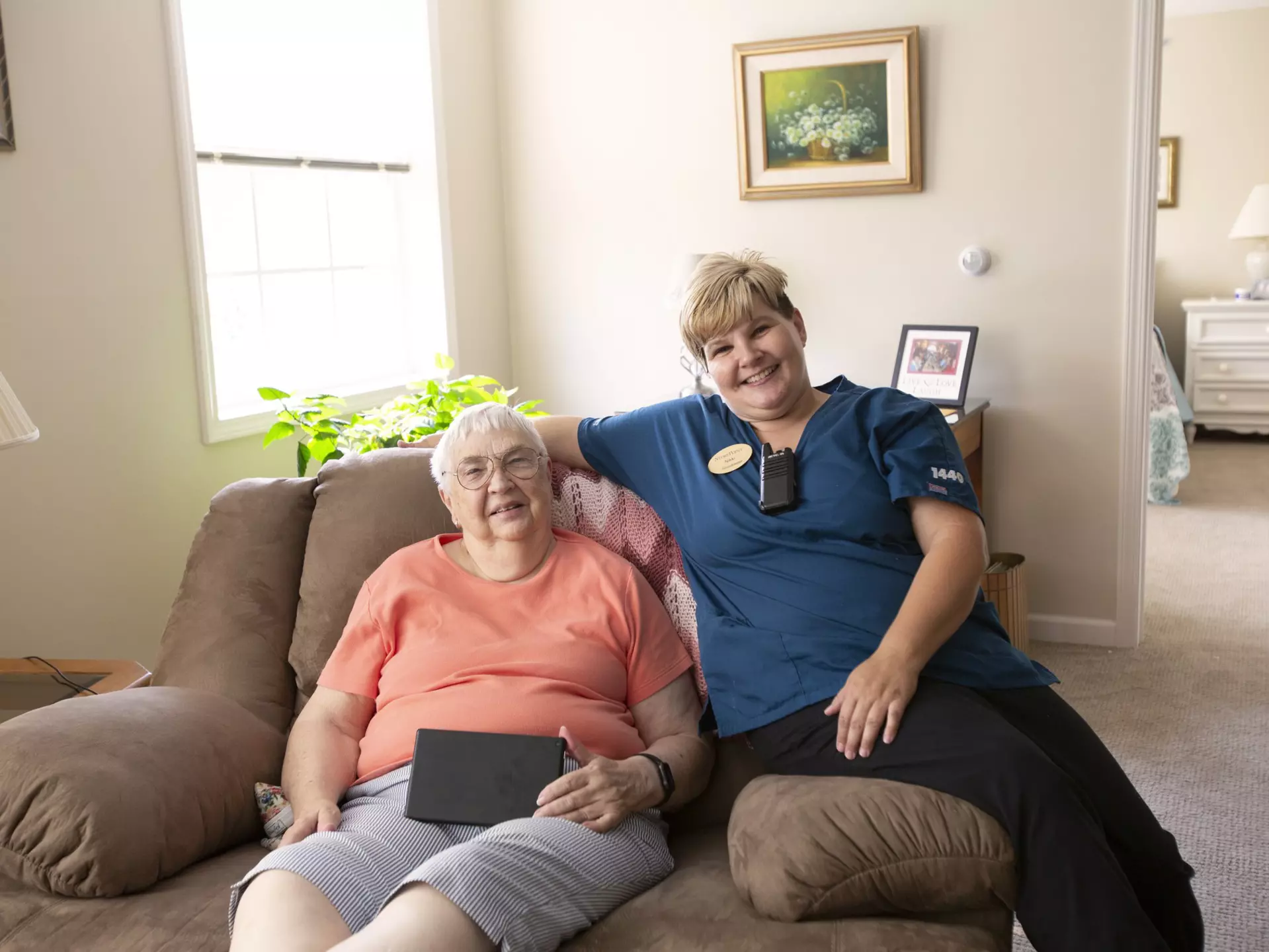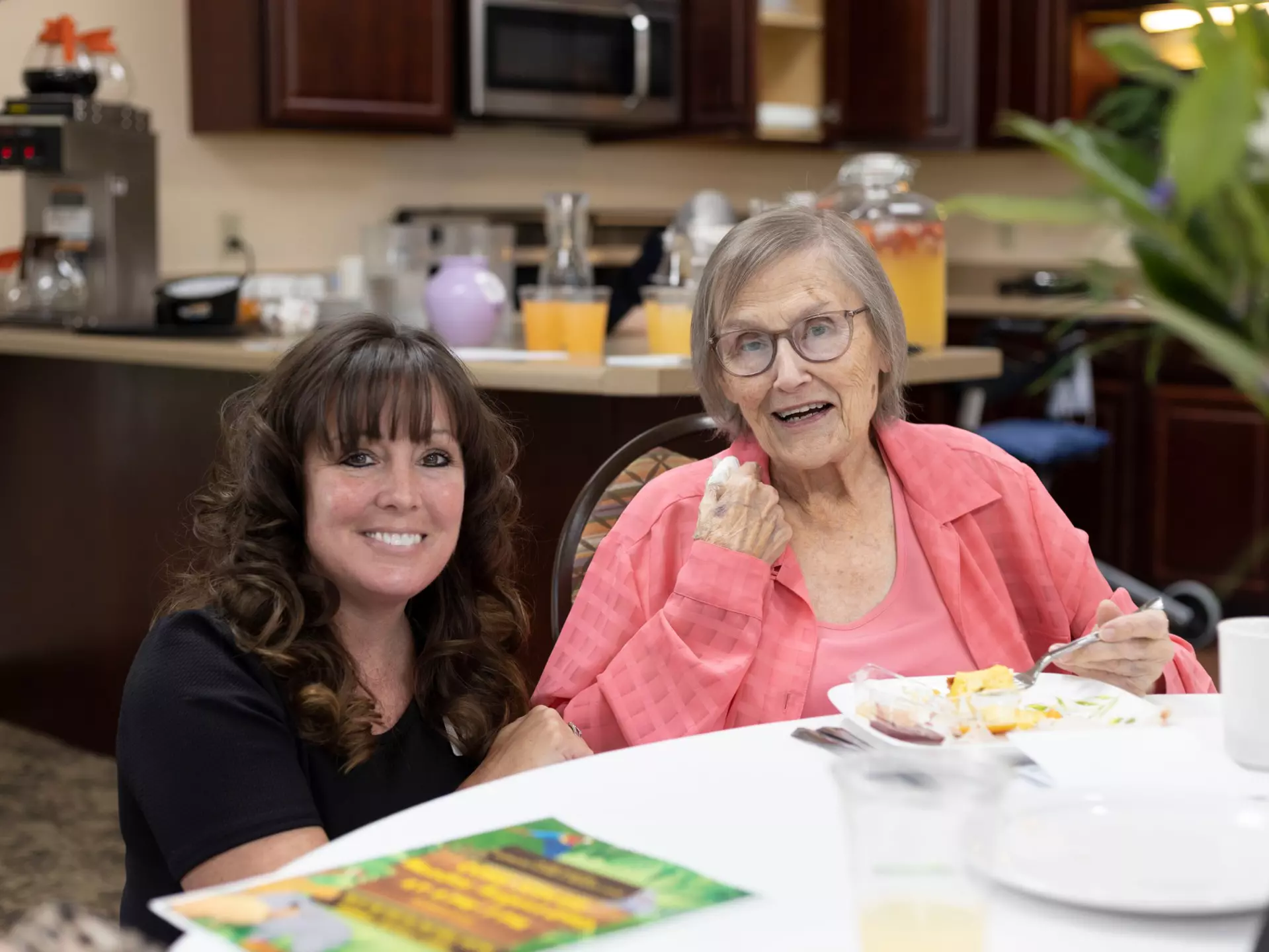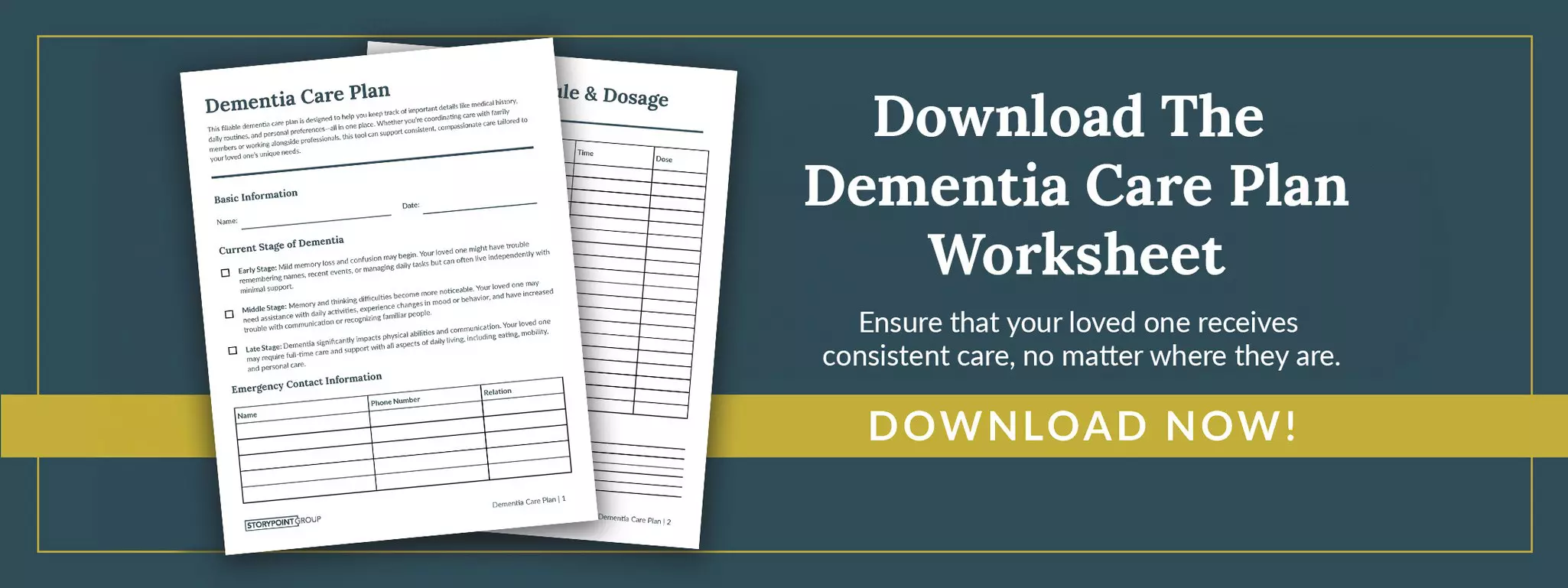When a loved one is diagnosed with a memory condition, it can be a difficult and emotional time for everyone involved. If you’re caring for someone with dementia, please know you’re not alone — we’re here to help guide you every step of the way.
As dementia progresses, it can affect a person’s ability to communicate and make decisions. As such, it’s usually a good idea for families to begin planning during the early stages of the disease.
A dementia care plan can help guide caregivers to provide the best possible support while honoring their loved one’s wishes and preferences. In this guide, we’ll explore what a dementia care plan is, why it’s important, and how to create one for someone you love.
What Is a Dementia Care Plan?
A dementia care plan is a structured document that outlines the specific needs and preferences of a person with dementia. It helps honor their wishes and supports caregivers and healthcare providers in making informed decisions throughout every stage of the individual’s journey.
As your loved one’s needs progress over time, it’s important to regularly review and update the care plan to help ensure it aligns with their evolving needs.
Key Elements Included in a Dementia Care Plan
One big question many families have is: What should be included in a dementia care plan? Every dementia journey is unique, so there’s no one-size-fits-all approach to creating a care plan. A good plan should reflect what matters most to your loved one, both now and in the future.
Here are some key elements you may consider including:
- Current Stage of Dementia: The first important thing to include is your loved one’s current stage of dementia. In the early stages, individuals are often still quite independent, but they may begin to need more daily support as their condition progresses. Understanding where your loved one is in their journey can help you understand the level of support they’ll need.
- Home Safety Considerations and Needs: As dementia progresses, symptoms like wandering and confusion can become serious safety concerns. If your family member uses safety or mobility aids, like walkers or grab bars, it’s a good idea to include those in their care plan, as well.
- Medication Schedule and Dosage: If your loved one takes medications for thinking, sleep, or other health conditions, keep an up-to-date list that includes what they take, when they take it, and the correct dosages. Maintaining an accurate medication schedule and dosage instructions makes it easier for new caregivers or doctors to step in and provide consistent medical care.
- Medical History and Existing Health Conditions: It’s also important to include your loved one’s full medical history in their dementia care plan. This should cover past illnesses, surgeries, allergies, and any chronic conditions, like diabetes or high blood pressure. Having this information readily available can help doctors and caregivers provide the right support, especially in emergency situations.
- Emergency Contacts: Be sure to include the names and phone numbers of family members, close friends, doctors, or neighbors who should be called in an emergency.
- Personal Care Preferences: Have an open and honest discussion with your loved one about their personal care preferences. For instance, they might prefer showers over baths, have a favorite shampoo, or need help dressing in a certain way. These small details can make a big difference in their comfort and overall quality of life.
- Preferred Ways to Communicate: Communication can become more difficult as dementia progresses. During later stages of your loved one’s journey, it’s important to stay supportive and encourage them to express themselves in whatever way feels most comfortable. Maybe they respond better to visual cues than spoken instructions. Perhaps they get frustrated by too many questions. Or maybe they light up when someone calls them by their nickname. Little things like this can make daily interactions more positive and less stressful for both the person with dementia and their caregivers.
- Typical Daily Routines and Habits: A familiar daily routine can help ease feelings of anxiety and confusion, which are common in people with dementia. When creating a dementia care plan, it’s helpful to note the person’s typical routines, like when they wake up, mealtimes, and any favorite activities they enjoy throughout the day.
- Dietary Needs and Preferences: If your loved one has favorite foods or specific dietary restrictions, it’s essential to include them in the care plan. Be sure to note any allergies, dislikes, or mealtime routines. For example, if they prefer smaller meals or have difficulty chewing, it’s helpful to make sure caregivers are aware so they can provide the right kind of support for your family member’s needs.
- Exercise Routines: Physical exercise is beneficial for everyone, including individuals with dementia. If activities like daily walks or gentle stretching are part of your family member’s routine, it’s a good idea to note them in their dementia care plan.
Approaches and Frameworks to Dementia Care
It can be incredibly frustrating to watch someone you love struggle with the symptoms of dementia, and it’s normal to experience moments when you feel helpless or unsure of what to do next. Thankfully, there are several care frameworks that can help guide you in supporting your loved one.
Here are a few commonly used frameworks that can help you provide the best possible love and support to someone with dementia:
- The 4Rs: It’s common for individuals with dementia to experience fear, anxiety, or confusion. The 4Rs approach offers four helpful steps — Reassure, Reconsider, Redirect, and Relax to create a calming environment during moments of distress. For example, instead of correcting your loved one, you might reassure them that they’re safe, reconsider the situation from their perspective, gently redirect their attention, and stay relaxed yourself.
- The 6Cs of Caring: The 6Cs framework is widely used in health care and social support settings. It stands for Compassion, Competence, Communication, Courage, Commitment, and Care — core values that remind caregivers to show empathy, communicate clearly, and stay supportive through the everyday challenges of caregiving.
- The SPECAL Method: The SPECAL framework helps caregivers understand that while dementia affects a person’s reasoning and thinking skills, their emotional experiences and attachments often remain intact. By recognizing this unique perspective, caregivers can focus on creating a calm, positive environment, rather than correcting or challenging their loved one’s version of reality.
- Function Focused Support: As dementia progresses, it can affect a person’s ability to perform activities of daily living (ADLs). Function-focused care encourages caregivers to involve their loved one in light physical activities to help them preserve independence for as long as possible. This might include offering gentle prompts throughout the day or working alongside them to complete tasks together.

Examples of Daily Schedules of Dementia Patients
As dementia progresses, it may affect a person’s ability to manage their daily routine independently. They may have trouble sleeping, miss important tasks, become confused about time, or feel anxious for no apparent reason. Including a structured routine in your loved one’s Alzheimer’s care plan can help combat feelings of confusion and make the day feel more manageable for both of you.
To help guide you, below are two sample daily schedules for dementia patients. You may want to swap out activities based on what your loved one enjoys and their specific circumstances.
Early-Stage Dementia: Sarah’s Day
Sarah is 74 and was recently diagnosed with early-stage Alzheimer’s. She lives at home with her daughter and still enjoys gardening, light cooking, and talking on the phone with friends. She’s mostly independent, but occasionally misses doctor’s appointments or misplaces things. She also has arthritis in her hands and is beginning to find certain tasks challenging.
Sarah’s Needs:
- Occasionally loses track of things
- Mild difficulty with organization
- Has arthritis that limits hand strength
- Needs help taking medications
| Time | Activity |
|---|---|
| 7:00 a.m. | Wake up, use the bathroom, and do some light stretching |
| 7:30 a.m. | Breakfast, morning meds |
| 8:00 a.m. | Listen to the radio or music while doing light chores |
| 9:00 a.m. | Gardening with daughter (raised beds for easy access) |
| 10:30 a.m. | Snack and hydration break |
| 11:00 a.m. | Phone call with a friend |
| 12:00 p.m. | Lunch |
| 1:00 p.m. | Rest or quiet reading time |
| 3:00 p.m. | Light walk outside |
| 5:30 p.m. | Dinner and evening meds |
| 6:30 p.m. | Watch a favorite TV show or movie |
| 8:00 p.m. | Wind-down routine: warm tea, music, bath |
| 9:00 p.m. | Bedtime |
Late-Stage Dementia: James’s Day
James is 85 and lives in a memory care community. He’s in the later stages of vascular dementia and needs help with most daily tasks. He also has diabetes, limited mobility due to a past stroke, and is mostly non-verbal. He sometimes gets agitated in the afternoons and wakes up several times at night.
James’s Needs:
- Assistance with dressing, bathing, and eating
- Uses a wheelchair and needs help transferring
- Needs blood sugar monitoring and insulin administration
- Limited speech, communicates through gestures
- High risk of falling due to balance issues
- Prone to sundowning and disrupted sleep patterns
| Time | Activity |
|---|---|
| 7:30 a.m. | Gentle wake-up, assistance with bathing and toileting |
| 8:00 a.m. | Breakfast, morning medications |
| 10:30 a.m. | Light range-of-motion exercises |
| 11:30 a.m. | Hydration and snacking |
| 11:00 a.m. | One-on-one activity, like reading together or a gentle hand massage |
| 2:00 p.m. | Lunch (assistance with feeding), insulin shot |
| 3:30 p.m. | Nap or quiet rest |
| 5:30 p.m. | Calming activity: soft music, looking at old photo books |
| 6:30 p.m. | Dinner, evening medications |
| 6:30 p.m. | Night routine: sponge bath, lotion, change into sleepwear |
| Through Night | Check in every few hours |
Step-by-Step Guide to Creating a Dementia Care Plan
While every person’s journey with dementia is unique, developing a care plan can help you stay organized and improve your loved one’s quality of life.
Here’s a step-by-step guide to creating a dementia care plan for someone you care about:
Assess Individual Needs and Preferences
Ideally, your family member’s needs should set the foundation of their care plan for dementia.
You may begin by noting down the following:
- Cognitive Abilities and Limitations: A physician can perform a comprehensive cognitive assessment to determine the type and stage of dementia, which is essential for developing an appropriate care plan. This evaluation typically includes standardized tests that measure memory, language skills, attention, problem-solving abilities, and other cognitive functions.
- Functional Abilities: Your loved one may need more help with their daily routine as symptoms of dementia progress. When creating a care plan, it’s important to identify what they can still do independently and which activities of daily living (ADLs) they need assistance with.
- Personal Preferences and Interests: Make a note of what your loved one likes and dislikes. This can include their favorite meals, hobbies, interests, or anything they’re especially passionate about.
- Current Health Status: Even if your loved one is generally healthy, it’s a good idea to review their overall health. This includes noting any other medical conditions, allergies, and specific health care needs. Be sure to list any medications they’re currently taking as well.
- Emotional Well-Being: People with dementia may experience feelings of anxiety, depression, or even physical pain. These challenges can have a significant effect on their emotional well-being.

Have an Open Conversation
Next, have an open and honest conversation with your loved one. Let them know you respect their autonomy and want to involve them in the planning process as much as possible. Take time to listen and note their wishes and preferences.
This is also a good time to involve close family members. Explain the purpose of the dementia care plan and how it’s meant to support your loved one’s independence and improve their quality of life. They may not agree right away, and that’s okay. Be patient, listen to their concerns, and gently address any worries or objections they may have about the plan.
Develop Specific Strategies and Interventions
Depending on your loved one’s circumstances, there are a few key interventions you may consider to help address their specific needs, such as:
- Establishing a consistent daily schedule for activities like meals, bathing, and bedtime
- Breaking down complex tasks into smaller, manageable steps
- Providing adequate lighting and ensuring your loved one can move around safely and comfortably
- Developing strategies for handling challenges like agitation, wandering, or sundowning
- Encouraging social interaction and brain-healthy activities
- Using clear, simple language to help address communication challenges
- Offering assistance with medication management to help ensure medications are taken as prescribed; consider using medication organizers or reminders
- Ensuring the person is eating well and drinking enough fluids
- Encouraging regular light physical activity to help maintain strength and mobility
- Seeking out options to help manage any pain or discomfort
Document the Dementia Care Plan
Organize the information and keep a written record of your loved one’s dementia care plan. Include as much detail as possible about what matters most to them — their needs, preferences, and important contact information. Go through the plan together to help ensure it reflects their wishes. It’s also a good idea to share the plan with your loved one’s care team, which may include their physician, social workers, or other family caregivers.
Review and Update the Plan Regularly
As your family member’s condition progresses, you may need to update their dementia care plan to reflect their changing needs and preferences. Be sure to share updates about their progress and any challenges you’re facing with the care team. When needed, consider reaching out to doctors, nurses, social workers, or other specialists for additional support.
How Memory Care Communities Fit Into Dementia Care Plans
It’s natural to want the very best for our loved ones, and that includes making sure they receive the right kind of support for their specific needs. While supporting them at home can be a deeply fulfilling experience, it may become difficult to fully meet their needs as dementia progresses.
Memory care communities are specifically designed to support the unique needs of people with dementia and other memory-related changes. If you’re finding it challenging to meet your family member’s needs at home, a memory care community can enhance your loved one’s quality of life and help them make the most of each day.

StoryPoint Group Communities: Here for You and Your Loved One
At StoryPoint Group communities, we treat every resident like family. We understand that each person’s journey is unique, which is why we take the time to get to know their specific needs — so that we can provide the best possible experience for them.
If someone you love could benefit from additional support, including memory care, we’re here to guide you every step of the way.
To learn more, give us a call today at 1-844-275-9990 or schedule a tour at your nearby StoryPoint Group community.














